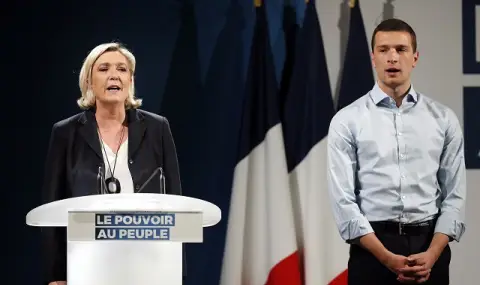28-year-old suburbanite Jordan Bardella has soared thanks to Marine Le Pen. Now he can become the youngest prime minister in the history of France. What is known about this political prodigy?
The French today elect the new members of the Lower House of Parliament in a runoff. Last Sunday, the far-right "National Assembly" won 33% of the vote - a major blow for the country, which last had a far-right government during the Nazi occupation in World War II.
Le Pen and Bardella have turned the extreme right into the first force
According to the forecasts, “The National Assembly“ could win a majority in parliament that would make 28-year-old leader Jordan Bardela the youngest prime minister in French history. If that happens, he will have to share power with President Emmanuel Macron.
Macron's party slumped to third place in the snap election the president called after the far-right won European Parliament elections in early June. Bardella is seen as a new face who, under the leadership of Marine Le Pen, has helped the party shake off the image of a fringe party mainly associated with racism and anti-Semitism. The French far-right leader made Bardella her protégé and appointed him party spokesperson at the age of 21. In 2022, she entrusted him with the leadership of the “National Assembly” so that he could focus on the struggle for the Elysee Palace. Le Pen plans to run for president for a fourth time in 2027. Her victory this time around looks more possible than ever, and that's partly because of Bardella's popularity. But what do we know about this political prodigy?
Nationalist and son of immigrants
Bardella joins the “National Assembly” already at the age of 16. He studied at the Sorbonne, but interrupted his studies to concentrate on politics. In 2019, when he was only 23, he was elected as an MEP. The far-right leader is actually the son of Italian immigrants. His father also has Algerian roots. Bardella was born and raised in the Paris suburb of Saint-Denis. “I came from somewhere else, but here I became who I am. I married French history”, he tells his more than 1.8 million followers on TikTok.
“His identity based on migrant origins is part of Bardella's mythology,” says Martha Lorimer, who studies the far right at Cardiff University. “That is one of the things that makes him attractive - he represents part of the new electorate that the National Assembly is trying to attract.”
Marine Le Pen's leadership and Bardella's popularity greatly expanded the party's electorate and attracted young voters. In 2007, when the “National Assembly” was still led by Jean-Marie Le Pen - Marine's father - in the second round of the parliamentary elections, the party received only 0.1% of the vote. In 2022, under the leadership of his daughter, the party won 17.3% of the votes in the runoff.
“The New Face of the Far Right”
The perception that Bardella has turned the party into a moderate political force, however, is wrong, Lorimer believes. On the one hand, the party abandoned its most extreme positions, such as the idea of taking France out of the European Union and NATO, the ban on same-sex marriage and the return of the death penalty. However, Bardella was initially brought in to contain the more extreme supporters. “His role was to keep the more radical supporters of Le Pen while she herself demonstrated herself as more moderate and more suitable for the presidency”, explains the expert. “But all that seems to have changed. Now this young man who doesn't look like a fascist has become the new face of the extreme right.”
His anti-immigration positions have not changed, Lorimer added. One of the key policies of the “National Assembly” is the so-called national priority - according to this idea, French citizens should enjoy priority when looking for work, as well as in terms of access to social benefits and housing. According to critics, this would mean serious discrimination against people who live in the country legally and pay taxes.
Will Bardella be different if he becomes prime minister
The far-right leader has also been accused of sharing far-right conspiracy theories – for example, the “great replacement theory”, according to which white Europeans are being replaced by migrants through demographic changes imposed by the political elite. A number of experts have repeatedly debunked the credibility of this claim, which is being spread by neo-Nazis and far-right extremists.
In 2021, in an interview with a French television, Bardella said: “I don't like the concept of “the great replacement”, because it is not clear, it is a very intellectual slogan, but it points to a reality that is a fact”. And he added: “Walk around the neighborhood where I grew up”. A large number of immigrants of Arab and African origin live in the area today.
